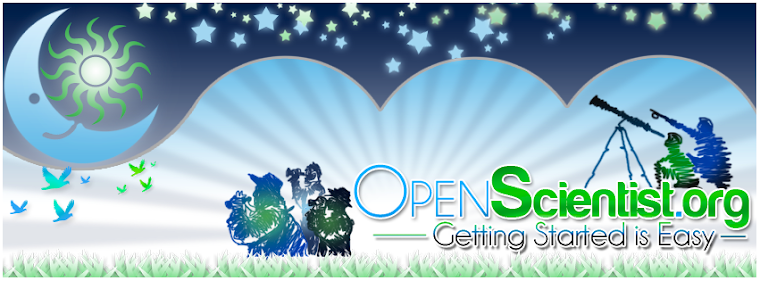But what have I missed?
 |
| Photo Courtesy: OpenScientist.org |
Crowdfunding: Some new projects have been announced through various crowdfunding platforms that citizen scientists may be interested in.
The first might be of special interest to all of my readers....an Experiment.com project to research who reads science blogs and why. As a reader of one right now, and someone who might help answer those questions and help us science bloggers better meet your needs, this could be a good one to support. They are only asking for $6,000. Check it out here and think about whether you have a few extra bucks to give.
Also, for people near my home town of Washington, DC, the Greenbelt MakerSpace group is looking to expand into the community with a new mobile MakerWagon. Not only is this a great idea, but the DC area is a prime area for citizen scientists but which has, sadly, not really begun to tap its potential. It's also a great way to get kids involved in STEM education. I have not formal connection with them but any help you all can give would be appreciated by all. You can check them out here.
Scientific Press: Back in August the prestigious journal Nature published “Rise of the Citizen Scientist” recognizing the incredible growth our field has seen and the many contributions we’ve already made. As an editorial coming from one of the most trusted (and wide-read) names in science this can be a very positive thing. Even the well-meaning discussion of issues around data quality, health confidentiality, and recognition are important to address and are things the citizen science field itself has grappled with for a long time. But the concerns about political motivation of volunteers and its potential to raise conflict of interest concerns struck an odd chord.
The Citizen Science Association followed up by registering some concerns with those ideas, and I find myself agreeing with them. Without rehashing arguments already made well by others, my concern is about the scientific community being so ready doubt citizen science data on the basis of the presumed motivations of a subset of volunteers. Industry and academic researchers all have their own biases and potential conflicts of interest, and people pay much less concern to those conflicts even though the dollar amounts are much greater. For citizen scientists the individual stakes are much smaller and should raise much smaller concerns. Also, unlike in academic and industry research, many more people are often involved in citizen science studies which mitigates the impact of those very conflicts. So instead of singling out citizen science with special concerns, the field should be applauded for discovering methods of reducing scientific conflicts of interest. But this also provides me hope as I foresee future research in our field looking at this very subject and showing the inherent value of our field, much the same way research on data quality in citizen science showed the data is not only as reliable as from traditional sources, it can often be better.
And that's just for starters! It's been a busy summer but time to get back to work. So keep following me here, on Twitter (@AnOpenScientist), and on Facebook for deeper dives and more frequent updates.
